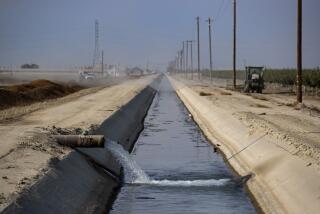Throwing Cold Water on the Wetlands : If new report is right, White House needs to think again about revised protection rules
- Share via
Even as environmental advocates and the Bush Administration argue over how much of the nation’s surviving wetlands to save, a panel of scientists says saving what’s left is not good enough.
That message, delivered as the White House is about to go public with a scaled-back version of wetland protection rules, is strong enough to suggest that President Bush needs to rethink the Administration proposals.
To avoid an irreversible decline in the quality of life, the scientists say, the nation must actually increase wetlands by restoring what has been lost.
As far from the ecological mainstream as common swamps may seem, they are breeding grounds for fish and feeding grounds for birds. Wetlands act as natural filters to purify water that sinks into underground aquifers.
Appointed by the National Research Council, the panel reports that half of the natural wetlands of the United States have vanished in the last 200 years. It urges a dramatic reversal by restoring many of the swamps, rivers and lakes that have been lost, as well as reclaiming 400,000 miles of polluted rivers and 2 million acres of polluted lakes over the next 20 years.
With America’s wetlands vanishing at a rate of 290,000 acres a year, that is a tall order, more so politically than financially, and more so financially than technically.
The panel suggested that a trust fund fed by fines paid by developers and others for damaging the environment would be one good place to start accumulating money for restoration work. As for the technical side, the job is “scientifically realistic and desirable,” the panel said.
Under existing guidelines the Corps of Engineers approves 95% of all requests for permits to fill wetlands for development; only 5% are found to risk “unacceptable” damage to the environment. But a coalition of farmers, land developers and oil and gas producers says the rules should be made even more lax, and that is the direction in which the Administration seems to be headed.
In seeking a common definition for all agencies involved in managing wetlands, Washington wrote a handbook two years ago categorizing as wetland any ground saturated for seven straight days. In the face of the farmer/developer counterattack, the Bush Administration now wants to increase the number of required wet days. Wetland advocates charge that this proposal would violate the President’s campaign promise to allow “no net loss” of wetlands.
In light of the panel’s finding, another look at the problem by the White House surely is in order.
More to Read
Sign up for Essential California
The most important California stories and recommendations in your inbox every morning.
You may occasionally receive promotional content from the Los Angeles Times.













